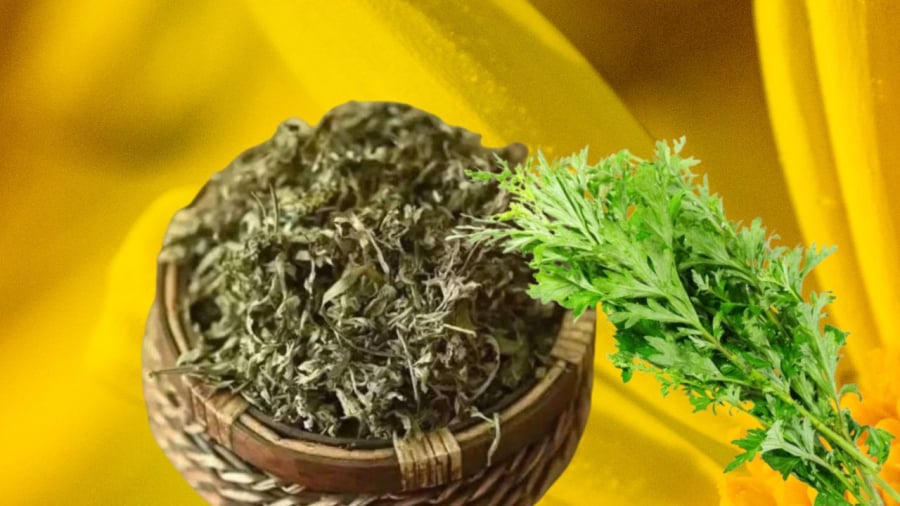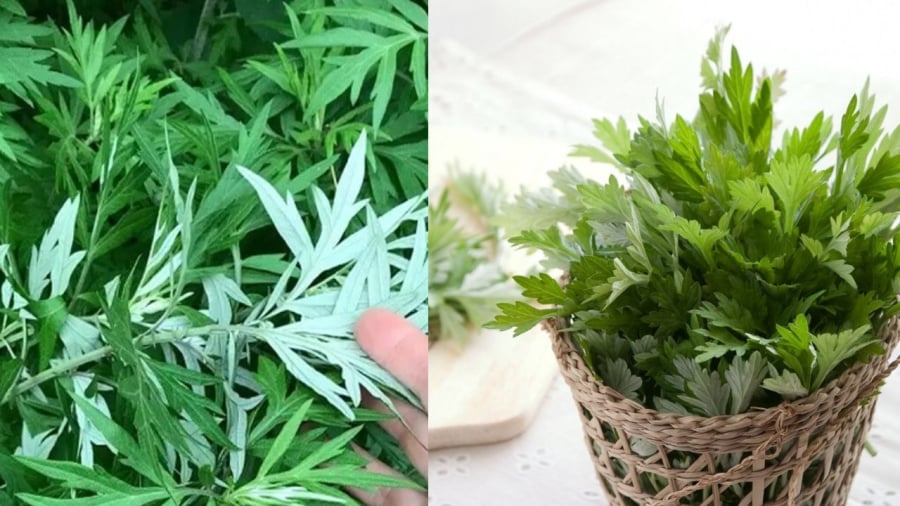The Role of Mugwort
Mugwort, or Artemisia Vulgaris, is a familiar herb in Vietnamese cuisine, known for its bitter and slightly spicy taste, and abundant aromatic essential oils. Commonly paired with balut, chicken soup, chicken hot pot, or omelets, mugwort is also revered in folk medicine for its ability to alleviate headaches and body aches and is used in steam treatments to relieve fatigue and flu-like symptoms.
From a spiritual and feng shui perspective, mugwort is considered a sacred plant, associated with pure yang energy. In feng shui, planting mugwort in front of a house is believed to bring auspiciousness and positivity. As a pure yang herb, mugwort is thought to have the power to transform negative energies, ward off evil spirits, and bring good fortune. It is a favored plant among shamans and spiritual practitioners.

Mugwort can be used fresh or dried
In traditional practices, dried mugwort was hung in front of houses or carried in pouches when traveling. Dried mugwort is believed to ward off evil spirits and negative energies. Moreover, the aromatic essential oils in mugwort have antiseptic properties, helping to purify spaces and remove toxins, making it ideal for smudging rituals to cleanse a household.
Feng Shui Applications of Mugwort
While some cultures believe mugwort to be a sacred plant of ghosts and use it for spellcasting, in Vietnam, the applications are primarily focused on its positive, protective energy:
– Planting mugwort around the house promotes a fresh and vibrant atmosphere, enhancing positive yang energy.
– Drying and hanging mugwort over the bed or at the front door is thought to bring good luck and protection.
– Burning dried mugwort leaves is believed to purify the air and drive away negative entities.
– Carrying a pouch of mugwort when traveling is considered a protective measure.
– Brewing a strong mugwort tea and using it to mop the floors or bathing in it is believed to relax and rid oneself of bad luck.

Mugwort holds auspicious significance in feng shui
Traditionally, it was also recommended to plant mugwort in front of the house to repel negative energies and have a readily available medicinal herb. Growing mugwort is believed to bring peace and protection to the household, safeguarding the family’s health.
Additionally, mugwort is an effective mosquito repellent, further contributing to its role in maintaining good health. Burning dried mugwort leaves helps keep mosquitoes at bay, and hanging bundles of fresh mugwort at the entrance is thought to ward off evil spirits and invite good fortune. Brewing a mugwort tea and using it for bathing is also a traditional practice to ward off illness and bad luck.
Cultivating Mugwort
Mugwort is easy to cultivate and thrives even in harsh conditions with minimal care. It can be grown in various locations, including the front, sides, or backyard, and can be planted directly in the ground or in pots. Propagation can be done through seeds, seedlings, or cuttings. To ensure healthy growth, consider the following:
– Mugwort thrives in sunny conditions, so ensure it receives adequate sunlight, at least 5 hours daily, for optimal photosynthesis.
– When first planting mugwort, water it twice a day, in the morning and evening. Over time, it becomes drought-tolerant.
– Mugwort spreads quickly, so there is no need for excessive fertilizing or frequent watering.
– Mature mugwort is drought-resistant and does not require frequent watering.
– It can be grown in plastic crates, plastic pots, or directly in the ground.
Reference information for contemplation
The Kitchen’s Dilemma: Which Way Lies Health and Happiness?
The placement of your kitchen can have a significant impact on your wealth and prosperity, according to Feng Shui principles. It is believed that positioning your kitchen in certain directions can lead to financial losses and misfortune. Avoid placing your kitchen in these two directions at all costs to prevent regret and ensure a harmonious flow of energy in your home or business premises.





































